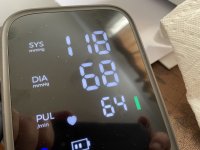decaf herbal iced tea sounds like a winner and not hard to make from tea bags versus per bottle price.
Just need a nice container for fridge. And if I wanted to sweeten it at all, is Truvia a healthy enough alternative?
I just worry that anything sweet is tricking some sweet sensor in my system that starts some unwanted hormonal increases.
all that cereal I've been eating. The good stuff, Kashi, whole grain, nuts, cheerios, etc.
but now I know it just runs to sugar.
If I wasn't prediabetic, I honestly wouldn't care and would gobble down every roll in sight. Not any more.
But I do love getting my required dose of blueberries on cereal. I eat cereal for roughage, though maybe subconsciously due to the sugar...,
thinking it was good for me.
I'm guessing a rice cereal would be better. Breakfast is a problem. Other than eggs and meat, what else to eat?
Doc told me he'd rather see me eat leftovers from night before than cereal, muffins and heavy carbs.
What sticks to you? Oatmeal?
I can't eat eggs every morning.
Oatmeal. Broccoli. Blueberries. All good for me.
Weren't oats supposed to be good for your heart? Or did they have to retract that too?
Health claims for food are pretty restricted now.
reminds me I have a variety of oatmeals in cupboard. Looks like it's time to try them out.

